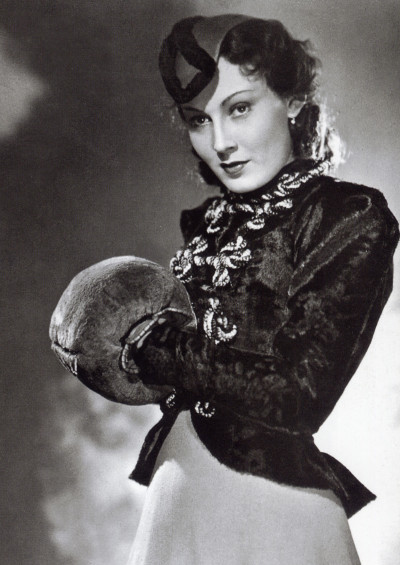Lida Baarova (Lida Baarova)

Born Ludmila Babková, she studied acting at Prague Conservatory and got her first film role in a Czech film at the age of 17. Her mother appeared in several theatre plays and her younger sister, Zorka Janů, was also a film actress. After being discovered by talent scouts for the German film studios, Baarova left Prague for Berlin. In Berlin she met Gustav Fröhlich, a German actor, and starred in several films with him. In 1935, following her successful appearance in the German film Barcarole, she received several job offers from Hollywood studios. She turned them down, but later regretted it and claimed to her biographer, Josef Škvorecký: “I could have been as famous as Marlene Dietrich.”
After her engagement to Fröhlich, they moved to Schwanenwerder on the outskirts of Berlin, where their house on the (later named) Karl-Marx-Strasse 8 was close to the residence of Joseph Goebbels on Inselstrasse 8. Goebbels was the propaganda minister in Adolf Hitler’s National Socialist government, with a decisive voice in German film production. Baarová met Goebbels in 1936, while working for Ufa films. Gradually, they became closer and started a relationship that lasted over two years. Their love affair caused serious complications between Goebbels and his wife Magda. Mrs Goebbels eventually decided to ask Hitler for permission to divorce Goebbels. The Führer intervened on 16 August 1938. Baarová was told by Count Helldorf, the Police President of Berlin, that she had to quit her relationship with Goebbels and leave Germany, on Hitler’s direct order. The recently completed film A Prussian Love Story which depicted the love affair between William I and Elisa Radziwill was banned. She fled to Prague in 1939 and, in 1942, to Italy, where she starred in such films as Grazia (1943), La Fornarina (1944), Vivere ancora (1945) and others.
After Allied troops occupied Italy, she returned to Prague, where she dated her old friend Hans Albers, another of Germany’s film idols. In April 1945, Lída Baarová left Prague for Germany, to join Albers in his country house on the shores of Lake Starnberg. On the way, she was taken into custody by the American military police, imprisoned in Munich, and later extradited to Czechoslovakia.
In Czechoslovakia, 1945, Baarová was taken into custody on suspicion of collaboration with the Germans during the war. She was released after 18 months of custody due to lack of evidence. She had never been convicted or sentenced. While in custody, she was often visited by Jan Kopecký who, like many others, was infatuated with her. Kopecký was a close relative of a prominent politician in the post-war government of Czechoslovakia and hoped he could arrange Baarova’s release from custody. Kopecký’s prominent relative did not approve of this and Kopecký himself faced persecution. This was one of the reasons why Jan Kopecký and Lída Baarová decided to emigrate in 1948. Prior to their escape to Austria, they married on 27 June 1947, and formed an itinerant troupe playing marionettes. From there, Kopecký emigrated to Argentina, leaving Lída behind to recuperate in the sanatorium of Dr. Lundwall.
In Austria, Lída attempted a comeback, but Anton Walbrook withdrew from a film where he was cast with her. To escape the resulting negative media, she left for Argentina, where she lived in extreme poverty. She decided to return to Italy. Her husband stayed in Argentina and they were divorced in 1956. Back in Italy, she appeared in several films, including Fellini’s I Vitelloni (1953), where she played the wife of a rich merchant. In 1958, she moved to Salzburg, where she performed in a theatre. She married Swedish physician Kurt Lundwall in 1969 (d. 1972).
In the 1990s Baarová reappeared on the cultural scene of the Czech Republic. She published her autobiography and a film, Lída Baarová’s Bittersweet Memories, appeared in 1995 and won an award at the 1996 Art Film Festival in Trenčianske Teplice, Slovakia.
Lída Baarová suffered from Parkinson’s disease and died in 2000 in Salzburg, while living alone on the estate she inherited after the death of her second husband, Dr. Lundwall. If she ever felt guilt about her past, she rigorously suppressed it. “There’s no doubt that Goebbels was an interesting character,” she observed in 1997, “a charming and intelligent man and a very good storyteller. You could guarantee that he would keep a party going with his little asides and jokes.” Her ashes were interred in Prague’s Strašnice Cemetery, where she rests with her parents and sister Zorka Janů.
Born
- September, 07, 1914
- Prague, Austria-Hungary
Died
- October, 27, 2000
- Salzburg, Austria
Cemetery
- Strasnice Crematorium
- Prauge, Czech Republic



